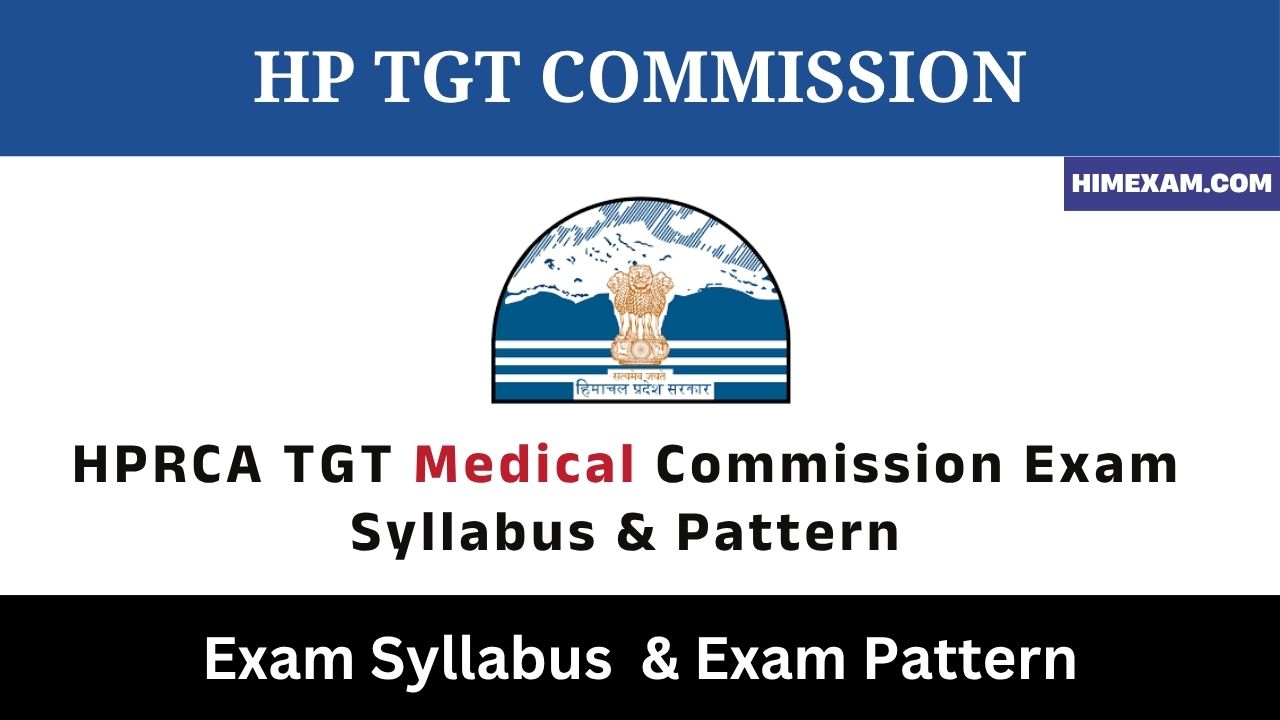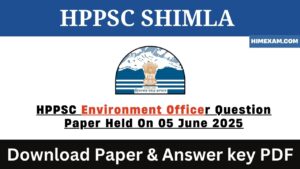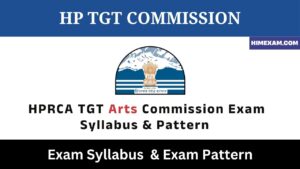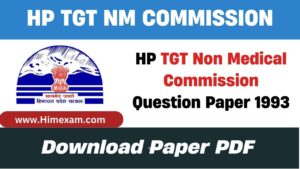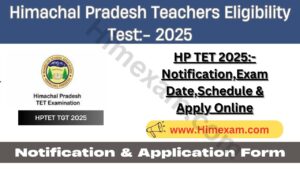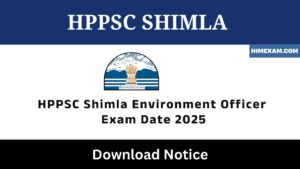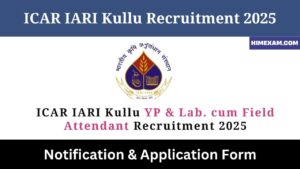Table of Contents
ToggleHPRCA TGT Medical Commission Exam Syllabus & Pattern
What is HP TGT Commission Exam:-HP TGT Commission exam is a recruitment exam conducted by the Himachal Pradesh Rajya Chayan Ayog Hamirpur (HPRCA). This exam is for recruitment to the post of TGT Teachers in Himachal Pradesh Govt Schools.
HPRCA TGT Medical Commission Education Qualification:-
1) B.Sc.(Medical) Post Graduation (M.Sc. in any science discipline provided that candidates should have passed their Graduation Degree in B.Sc.(Medical)) from a recognized University with at least 50% marks in B.Sc.(Medical) or Post Graduation and 1 year’s Bachelor of Education (B.Ed.)/2 Year’s Bachelor of Education (B.Ed.)/Bachelor of Education (B.Ed.) from National Council for Teacher Education (NCTE) recognized institution. OR Post Graduation (M.Sc. in any science discipline provided that candidates should have passed their Graduation Degree in B.Sc.(Medical)} with a minimum of 55% marks and three-year integrated B.Ed.-M.Ed. from a National Council for Teacher Education (NCTE) recognized institution.
OR
Senior Secondary/10+2 in Science (Medical) with at least 50% marks and 4 year’s Bachelor in Elementary Education (B.El.Ed.). OR Senior Secondary/10+2 in Science (Medical) with at least 50% marks and 4 year’s B.Sc. (Medical)ED/B.Sc(Medical).B.Ed.
OR
B.Sc (Medical) with at least 50% marks and 1-year’s Bachelor in Education (B.Ed.) (Special Education) AND ii) Pass in Teacher Eligibility Test (TET) duly conducted by H.P. Board of School Education Dharamshala, Distt. Kangra or any other Agency authorized by the Government. Provided that a candidate must have passed Matriculation and 10+2 from any School/Institution situated within Himachal Pradesh. Provided this condition shall not apply to Bonafide Himachalis.
b) Desirable Qualification(s):-Knowledge of customs, manners and dialects of Himachal Pradesh and suitability for appointment in the peculiar conditions prevailing in the Pradesh.
Note(1):- Provided that minimum percentage of marks in graduation shall not be applicable to those incumbents who had already taken admission to the Bachelor of Education or Bachelor of Elementary Education prior to the 29the July, 2011.
Note(2):- Relaxation upto 5% will be allowed in minimum educational qualifications and also in minimum qualifying marks for TET to the candidates belonging to SC/ST/OBC/PWD categories of H.P.
Note(3):- In case of candidates who have taken admission in B.Ed. course on the basis of M.A./M.Sc. with at least 50% marks shall only be considered for the post of TGT.
Note(4): The minimum qualification as prescribed by NCTE on the date of publication of the Advertisement shall also be considered as part and parcel of these R&P Rules and the Government (in the Department of Elementary Education, H.P.) shall provide such changes in the minimum essential qualification to the recruiting agency till the date of publication of advertisement.
HPRCA TGT Medical Commission Exam Pattern & Syllabus
This exam is conducted online and the questions in it are multiple choice questions.
| Subject | No. Of Question | Marks |
|---|---|---|
| Subject Related Question(Bootany,Zoology ,Chemistry & Child psychology and development, pedagogy, teaching learning processes) | 140 | 70 |
| General Knowledge including General Knowledge of Himachal Pradesh, Current Affairs, Everyday Science, Logic, Social Science, General English & General Hindi of Matric standard | 60 | 30 |
| Total | 200 | 100 |
HP TGT Medical Commission Exam Syllabus
Botany & Zoology:-
- Botany: Cell biology (ultrastructure, cell cycle, mitosis, meiosis), plant anatomy (tissues, root-stem-leaf anatomy), plant physiology (photosynthesis, respiration, plant growth regulators), reproduction (flower structure, pollination, double fertilization), genetics (Mendel’s laws, DNA replication, transcription, translation), plant diversity (classification of algae, fungi, bryophytes, pteridophytes, gymnosperms, angiosperms), ecology (ecosystems, biodiversity, environmental issues), economic botany (medicinal plants, crops ).
- Zoology: Animal diversity (classification of non-chordates and chordates), animal tissues (epithelial, connective, muscular, nervous), human physiology (digestive, circulatory, respiratory, excretory, nervous, endocrine, reproductive systems), genetics (chromosomal theory, genetic disorders, human genome project), evolution (Darwinism, evidence of evolution), immunology (immunity, vaccines), diseases (common human diseases, pathogens), biotechnology (PCR, genetic engineering), wildlife conservation (endangered species).
Chemistry:-
- Basic Concepts: Atomic structure, isotopes, isobars, quantum numbers, electronic configuration, periodic table trends, chemical bonding (ionic, covalent, metallic), mole concept, stoichiometry.
- States of Matter: Gases (gas laws, kinetic theory), liquids (vapor pressure, surface tension), solids (crystal lattices, unit cells), solutions (concentration units, colligative properties).
- Chemical Reactions: Types of reactions (combination, decomposition, displacement), redox reactions, balancing equations, acid-base theories (Arrhenius, Bronsted-Lowry, Lewis), pH scale.
- Inorganic Chemistry: s-block elements (alkali and alkaline earth metals), p-block elements (boron, carbon, nitrogen families), d-block elements (transition metals), coordination compounds.
- Organic Chemistry: Basics (IUPAC nomenclature, isomerism), hydrocarbons (alkanes, alkenes, alkynes), functional groups (alcohols, phenols, ethers, aldehydes, ketones, carboxylic acids), polymers, biomolecules.
- Physical Chemistry: Thermodynamics (laws, enthalpy, entropy), chemical equilibrium, reaction kinetics, electrochemistry (cells, batteries, corrosion), surface chemistry (adsorption, catalysis).
- Environmental Chemistry: Pollution (air, water, soil), greenhouse effect, ozone depletion, acid rain, green chemistry principles.
- Chemistry in Daily Life: Medicines (analgesics, antibiotics), food additives (preservatives, artificial sweeteners), cleansing agents (soaps, detergents), fuels (petroleum, CNG).
Child psychology and development, pedagogy, teaching learning processes
- Child Psychology & Development: Stages of Child Development (Infancy, Early Childhood, Adolescence), Theories of Development (Piaget’s Cognitive Development, Kohlberg’s Moral Development, Erikson’s Psychosocial Development), Individual Differences (Learning Styles, Intelligence, Creativity), Role of Heredity & Environment, Social & Emotional Development (Attachment, Self-Concept, Aggression), Exceptional Children (Gifted, Slow Learners, Learning Disabilities).
- Pedagogy: Meaning & Principles of Pedagogy, Teaching Methods (Lecture, Demonstration, Project, Cooperative Learning), Models of Teaching (Inquiry-Based, Constructivist, Collaborative), Lesson Planning (Objectives, Strategies, Evaluation), Classroom Management (Discipline, Motivation, Reinforcement), Inclusive Education (Adaptations for Diverse Learners).
- Teaching-Learning Processes: Learning Theories (Behaviorism, Cognitivism, Constructivism), Factors Affecting Learning (Attention, Memory, Transfer of Learning), Teaching Aids (Audio-Visual, ICT, Multimedia), Assessment & Evaluation (Formative, Summative, CCE), Feedback & Remediation, NEP 2020 & Learner-Centered Approaches.
More Pages:-
हेलो दोस्तों ,आपका हमारी वेबसाइट Himexam.com पर स्वागत है। जैसा की आपको पता है हमारी वेबसाइट Himexam.com आपको समय-समय पर सभी HP Govt Jobs & All India Govt Jobs की Notifications प्रदान करवाती है। साथ ही साथ Himachal Pradesh Exam Previous Paper और Himachal Pradesh GK ,Himachal Pradesh & National +International Current Affairs के सभी नोट्स मुफ्त उपलब्ध करवाते है। हमारी वेबसाइट के अलग अलग प्लेटफार्म पर pages & Group बने है जैसे की facebook ,Telegram और Instagram .. अगर आप हिमाचल के किसी भी पेपर की तैयारी कर रहे हो तो जल्दी से इन groups के साथ जुड़ जाएं इनके लिंक नीचे table में दिए गए है।
Join Us:-
| Like Our Facebook Page | Click here |
| Join Us oN Telegram | Click here |
| Join Us On Instagram | Click Here |

